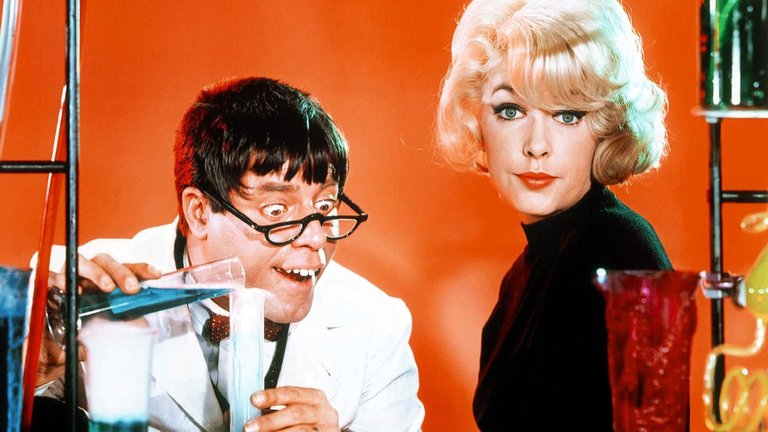Film Review: The Nutty Professor (1963)

In the 1950s and 1960s, Jerry Lewis was undoubtedly the most popular comedian in the United States, with a reputation that transcended the entertainment industry. However, as his popularity inevitably waned in later decades, he became the subject of vicious jokes and ridicule, particularly with regards to his alleged status as a "comedic genius" in the eyes of the French. While it is true that Lewis was indeed hailed by French critics, it was not solely for his comedic talents, but rather for his skills as a visionary film director. This estimation is well-deserved, particularly in light of his early 1960s comedy films, which showcased his innovative approach to storytelling and his technical prowess behind the camera. As one of the pioneers of video assist technology, Lewis played a significant role in making film production more efficient and cost-effective. Additionally, he mentored a young Steven Spielberg, who would go on to become one of the most acclaimed directors in Hollywood. Among Lewis' most notable films is the 1963 comedy classic, The Nutty Professor, which has been widely revered by critics and film historians as one of the greatest Hollywood comedies of all time.
The screenplay for The Nutty Professor, co-written by Lewis and Bill Richmond, draws loose inspiration from Robert Louis Stevenson’s Strange Case of Dr. Jekyll and Mr. Hyde. This adaptation takes a comedic twist, situating the narrative within a contemporary American university setting. In this film, Lewis portrays Professor Julius F. Kelp, a socially inept scientist whose clumsiness and awkward appearance render him the subject of derision among both peers and students. After failing to improve his physique through traditional means, Kelp resorts to scientific experimentation, ultimately concocting a serum that transforms him into the suave and charming "Buddy Love." This alter ego allows Kelp to navigate social situations with ease but comes with the challenge of maintaining his true identity in secrecy. The allure of Buddy Love becomes particularly compelling when it aids Kelp in winning over Stella Purdy, played by Stella Stevens, a beautiful student who frequents a popular student hangout known as the Purple Pit.
Filmed primarily at Arizona State University, Lewis aimed to lend an air of authenticity to the setting. However, some critics pointed out that many actors appeared too mature to convincingly portray college students. Additionally, they argued that Buddy Love's fashion choices and musical preferences felt outdated and disconnected from the burgeoning rock 'n' roll culture that characterised the rebellious youth of the 1960s. Despite these critiques regarding cultural authenticity, The Nutty Professor has aged remarkably well over the decades.
The film’s cinematography by W. Wallace Kelly employs vibrant colours that encapsulate the exuberance of 1960s kitsch. Unlike many films from this era where kitsch can feel forced or nonsensical, The Nutty Professor embraces its aesthetic wholeheartedly, creating an engaging retro charm that resonates with viewers even today. The bright visuals complement Lewis's energetic performance and enhance the overall comedic experience.
Walter Scharf's musical score further enriches the film's atmosphere; however, both Scharf and Lewis faced limitations as they had to rely on unused materials from Paramount's archives. Despite these constraints, Scharf’s compositions effectively support the film’s whimsical tone.
Ultimately, The Nutty Professor rests heavily on Jerry Lewis's shoulders as he masterfully navigates dual roles—both as the endearing Kelp and his increasingly obnoxious alter ego Buddy Love. This portrayal showcases Lewis's remarkable talent for physical comedy and character transformation. Buddy Love has become one of cinema's most iconic characters from the 1960s, often speculated to be inspired by Dean Martin, Lewis’s former comedy partner—a claim that Lewis consistently denied throughout his life.
Lewis's performance is complemented by Stella Stevens's charming portrayal of Stella Purdy and a talented supporting cast. Notably, experienced comedian Buddy Lester leaves a lasting impression in his brief role as a bartender.
The success of The Nutty Professor can be attributed in part to its straightforward narrative structure, which serves as a backdrop for an array of clever gags and comedic scenarios crafted by Lewis. More importantly, however, is the film's exploration of universal themes such as identity and self-acceptance. It poses an intriguing question: if given the choice, how many would prefer to embody Buddy Love rather than remain true to their authentic selves? This tension between superficial allure and genuine character resonates with audiences across generations.
Upon its release, The Nutty Professor achieved significant commercial success and has since been recognised as a classic in American cinema. Its enduring legacy was further solidified with the 1996 remake starring Eddie Murphy; however, despite Murphy’s undeniable talent and the film's commercial achievements—including sequels—the remake failed to capture the same critical acclaim or cultural significance as Lewis's original.
The Nutty Professor stands not only as a testament to Jerry Lewis's comedic genius but also as an insightful examination of identity and societal expectations. Its blend of humour and heartfelt moments ensures its place in cinematic history while continuing to resonate with audiences today.
RATING: 9/10 (++++)
Blog in Croatian https://draxblog.com
Blog in English https://draxreview.wordpress.com/
InLeo blog https://inleo.io/@drax.leo
Hiveonboard: https://hiveonboard.com?ref=drax
InLeo: https://inleo.io/signup?referral=drax.leo
Rising Star game: https://www.risingstargame.com?referrer=drax
1Inch: https://1inch.exchange/#/r/0x83823d8CCB74F828148258BB4457642124b1328e
BTC donations: 1EWxiMiP6iiG9rger3NuUSd6HByaxQWafG
ETH donations: 0xB305F144323b99e6f8b1d66f5D7DE78B498C32A7
BCH donations: qpvxw0jax79lhmvlgcldkzpqanf03r9cjv8y6gtmk9